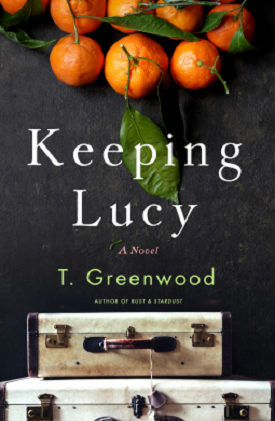 Synopsis:
Synopsis:
Keeping Lucy, inspired by actual events, explores how far one mother must go to protect her daughter.
Dover, Massachusetts, 1969. Ginny Richardson’s heart was torn open when her baby girl, Lucy, born with Down Syndrome, was taken from her. Pressured by the powerful family he has never defied, her husband, Ab, agreed to send Lucy to Willowridge, a special school for the “feeble-minded.” Ab told Ginny it was for the best because they cannot provide adequate care to Lucy. He tries to convince her that they should grieve for Lucy as though she were dead and try to move on.
Two years later, Ginny’s best friend, Marsha, shows her a series of newspaper articles exposing Willowridge as hell-on-earth — squalid hallways filled with neglected children have been discovered by an investigative reporter. Ginny, who was never convinced that sending Lucy away was the right decision, knows she can’t leave her daughter there any longer. With Ginny’s six-year-old son, Peyton, in tow, Ginny and Marsha drive to the school to see for themselves. What they find launches their heart-racing journey across state lines — and turns a determined Ginny into a fugitive.
For the first time, Ginny tests her own strength and conviction, finding herself not only fighting Ab’s domineering father, but her own husband, as well. Racing from Massachusetts to the Atlantic City shore, through the Blue Ridge Mountains of Virginia to a roadside mermaid show in Florida . . . Keeping Lucy is the searing story of how far a mother’s love can take her on her quest to protect her child.
Review:

“The Moon for all her light and grace
Has never learned to know her place.”
~~ Robert Frost
Against that backdrop, Greenwood sets her story in 1971. The Women’s Movement is gaining steam, but it is still a time when women lack power and autonomy. For instance, a woman could not yet have a credit card or loan issued in her name, and many professions were still hostile to women. Two years earlier, when Ginny and Ab’s daughter was born, Ginny held her child only briefly before she was literally ripped out of her arms and whisked away. Ironically, Ginny’s father died when she was only ten years old and she was raised thereafter by her single, working mother. Yet when Ginny met Ab in college and the two of them bonded over their shared love of poetry, both Ginny and Ab allowed their future to be commandeered by Ab’s overbearing father. Ab abandons his plans, acceding to his father’s demand that he attend law school and, upon graduation, join his father’s firm. The elder Richardson supplies the financing for the young couple’s home, and Ginny leaves her job at the college library behind in favor of being a traditional housewife, raising their son, Peyton, and spending her days ironing Ab’s shirts, preparing meals, and trying to keep her husband and in-laws happy, an impossible goal because of their disapproval of her. Ginny is barely an active participant in her own life, even though she loves her husband and child. As she describes it, “she had been so numb she could hardly feel her own misery.”
The doctor who delivers Lucy callously declares her “mongoloid. Which means severe mental retardation. She’ll be feeble-minded, no more intelligent than a dog. The hardship she will bring to your family — women never realize the impact that raising an imbecile has on a marriage. On the other children. You must think of your son.” As usual, Ab does not challenge his father, who insists that Lucy be placed in Willowridge and makes all of the arrangements by calling in a favor. Ginny does not fight for her child, instead going along as Ab tries to console her by promising that Lucy will be well cared for. They engage in a charade, letting all but their closest family members and friends believe that the child died. As time passes, Ab puts Ginny off when she suggests that they, at last, visit Lucy at Willowridge.
But Ginny cannot forget her daughter. “Mourning, this was exactly what the last two years felt like. Ginny had been asked to accept the loss of her daughter the way one would morn the loss of the dead. To pretend she had died. But she was not dead, and so this was a special kind of grief. An endless sort of sorrow.”
When Ginny’s best friend, Marsha, draws her attention to a series of newspaper articles exposing the abhorrent conditions at Willowridge and Ginny learns that a group of parents are filing a class action lawsuit, she comes alive. Discovering that Lucy has been a victim of neglect at Willowridge finally enrages Ginny, fills her with guilt and remorse. “The burden of the last two years during which her child had been a prisoner inside that horrific place weighed on her. While she had been going about her life — raising her son, reading books, and having tea — her daughter, her flesh and blood, had been ignored. Imprisoned. And she was the one who held that key. She’d been holding it the whole time.” Ginny becomes “overwhelmed with all the ways in which she had, in the past two years, failed her child. But she would fix this. She would talk to Ab, convince him that Lucy would be better off with them, and then she would bring her home.” Instead, she has to defy Ab, and enlists Marsha’s help. Ginny has never even learned to drive, another aspect of her complicity in her own helplessness. The two of them proceed to Willowridge where Ginny manages to check Lucy out of the institution for a weekend visit and begins to get acquainted with her now two-year-old child. But she soon discovers that she is powerless — she has no legal standing to make decisions about Lucy’s future. Nonetheless, she and Marsha embark on a dangerous “Thelma and Louise”-type journey. Ginny is determined that she will find a way to keep Lucy and raise her — as she should have in the first place.
“She only knew she was never taking Lucy back to that place.”
Greenwood accurately portrays a different, not all that long-ago era in America when both persons with disabilities and women were viewed as less than. As Ginny and Marsha travel, Greenwood reveals with heartbreaking clarity how Lucy has suffered from neglect and discovering the truth transforms Ginny. Marsha, Ginny’s polar opposite, is a fascinating a character — a woman who has done all the things and taken all the risks Ginny, cocooned in her predictable and secure life, never has. But she too is at a turning point in her life and must make a decision, even as the two women continue working their way to Florida where, they hope, their half-baked plan will come to fruition, and prevent Ginny from being arrested and prosecuted. As the story progresses, Greenwood credibly portrays the strong bond between the two women, as well as Ginny’s gradual empowerment and increasing appreciation of and reliance upon her own ingenuity and resourcefulness. So Keeping Lucy is, in a very real sense, a coming of age tale. The pace of Keeping Lucy is relentless and Greenwood holds her reader’s interest by placing Ginny and Marsha in a series of predicaments that test their strength and luck.
The spineless Ab is indisputably the most maddening character. Greenwood tells the story of how he and Ginny met, fell in love, and married through a series of flashbacks interspersed with the narrative set in 1971. Ultimately, although Ab is not the focus of Greenwood’s tale, she describes in plausible detail how Ab became so eager to please his domineering father, and how his circumstances fueled his choices and what Ginny perceives as serious betrayals of her and their children.
Keeping Lucy is an interesting look back at the way things used to be in the United States that will prove eye-opening for readers who are too young to recall those times, and remind those who do remember just how much has been achieved in terms of women’s rights, social justice, and the way, as a society, we perceive and care for those with special needs and abilities. It is a thoroughly engrossing tale about motherhood and female friendships; and, through her examination of Ginny’s metamorphosis, confirmation that it is never too late to stand up, be counted, and do the right thing. Especially for one’s own child.
Enter to Win a Copy of Keeping Lucy
NOTE: The book may only be mailed to a United States address.



6 Comments
This is a new author for me. I enjoy discovering new authors. Nice cover.
This one has been on my list! I hope to read it soon.
I have not read one of the author’s books before, but I was drawn to the synopsis of this one.
I Liked this one VERY much. Posted my review two weeks ago!
I have not read any books by her, but I have heard really great things about Rust and Stardust, and I take recommendations from the reading community serious. I can’t wait to read her work!
I recently read Grace and really enjoyed it. I’m looking forward to Keeping Lucy. It sounds fantastic!